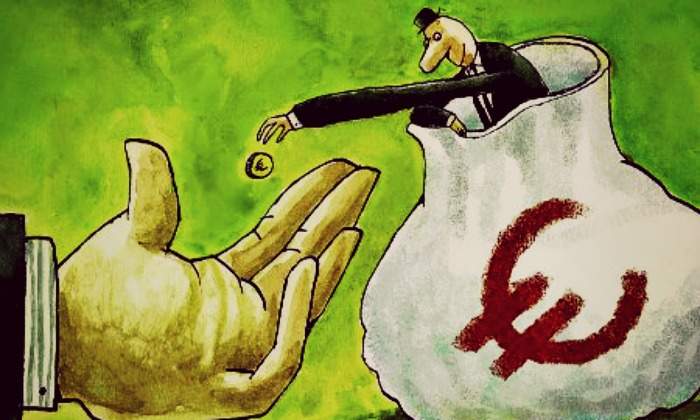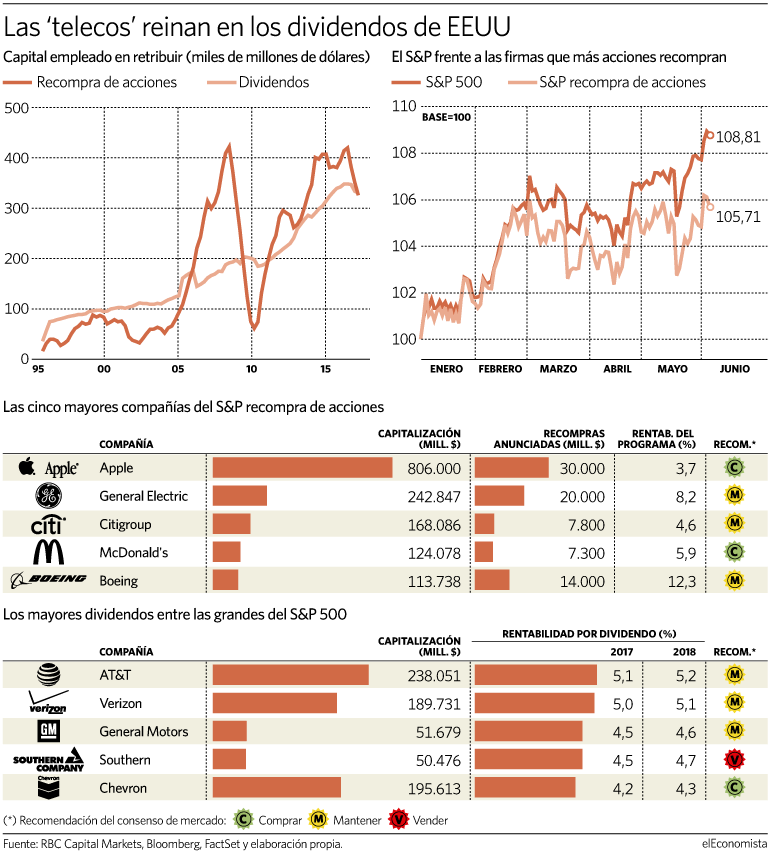
Since 2008, US companies with higher share buyback programs have recurrently beaten the market -only in 2015 were worse than the S & P 500-. However, this situation has changed so far this year, with the buyback losing strength on the floor and in the volume of capital for these operations by US companies.
The S & P Index Buyback index rises less than 6% so far this year, 3 percentage points less than the S & P 500. This trend has been accompanied by a decline in the volume of repurchases. According to data compiled by RBC Capital Markets, the amount used by US companies to withdraw some of its securities market has fallen to the area of 325.000 million dollars, in contrast to over 400,000 million dollars that came to use just a year ago when he approached near record highs graphic--see.
The volume of capital used by US companies dividend is at the same level as that used to buy back shares, which has not happened since 2010.
According to data collected by the entity, the total amount allocated to dividend payments by US companies has also fallen slightly in recent months, but the decline has been lower.
"As a starting point, we find that dividends are more stable than share buybacks. On average, cuts in payments to shareholders in all recessions since 1970 were only one quarter of the drop in profits. Meanwhile, the culture of the buyback find that are freely available, and oscillating with confidence, profits and market conditions ,"explained from UBS.
According to data collected by the Swiss entity, programs to remove outstanding shares across the Atlantic went from renting around 0.5% in 2004 to offer almost 3.5% in 2008 to then dropped to slightly above 0.5% in 2009. the programs buybacks US rented about 2% in 2016 and UBS estimate that this year will fall to 1.5% and environment in 2018 they will remain flat.
According highlight One of the circumstances that are causing such operations have lost prominence are the high valuations of the US market. The S & P 500 is trading at a PER (times benefit in stock price is collected) 17 times to 12 months, implying a 13% premium over the average for doing so since it started millennium. "Analysts estimate that profits will grow 11% in 2017, but valuations have also climbed, so that companies may have to pay more to acquire their own titles , " explains FactSet analysis team.

from Citi, the US was the only major market where share buybacks exceeded the dividends. "US companies now distribute as much capital as they used to reinvest in your business and have progressively taken the form of share buybacks rather than paying dividends," materialize from the US entity.
The threat of a kind
One of the problems that warn experts on buybacks programs across the Atlantic is the tendency of some companies to buy back their shares into debt.
One of the most significant cases is that of McDonald? S. Between 2014 and 2016 the fast food firm spent over 20,500 million in the same period when the earnings of the company did not reach 14.000 million.
According to data published by FactSet, a total of 119 companies in the S & P used in the last 12 months money buying shares that gained in the period. "With many companies issuing debt to finance their buybacks , rate hikes will make the cost of repurchasing shares is higher , " warn from FactSet. In the meeting that the Fed willhold this month a new rate hike is expected and the company plans to raise the price of money a third time before the end of the year, although the market doubt the latter.
No more 'Trump-trade'
One of the great strengths on which it counted the market for US listed impulsasen benefits were tax cuts announced by Trump, few promises that the market no longer believes. Investors came to price the new president hand cut the corporate tax to 15% and that could make a kind of tax amnesty to repatriate the cash that companies have abroad, which would have supported profits and thus pay . "We expect firms to direct most of its cash to buy back shares repatriated," Goldman claimed in January.
Repurchases will not start in Europe
Historically, US companies have been buying back shares much more active than European, a trend has not been reversed.According to data from UBS, the buyback in the Old World have offered no shareholder return since the crisis, as share issues , especially the banca- offsetting


No hay comentarios:
Publicar un comentario
No se admiten comentarios con datos personales como teléfonos, direcciones o publicidad encubierta